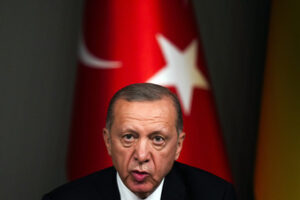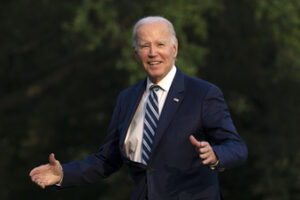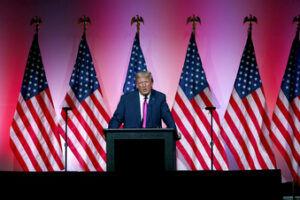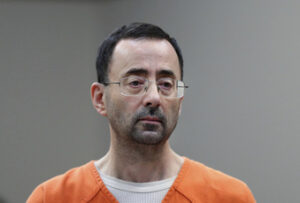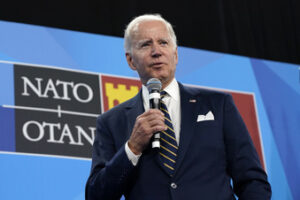Brazil manifestos seek to rein in Bolsonaro before election
6 min read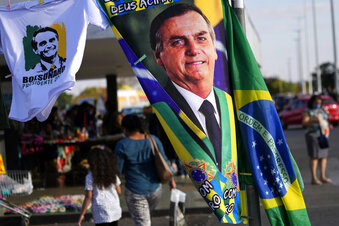
FILE - A banner emblazoned with an image of Brazil's President Jair Bolsonaro, who is a candidate for reelection, is displayed for sale in Brasilia, Brazil, Aug. 2, 2022. Almost half a century later to the day, thousands are expected to rally on Aug. 11, for the readings of two documents inspired by the original “Letter to the Brazilians”. Both new manifestos defend the nation's democratic institutions and electronic voting system, which Bolsonaro has relentlessly attacked ahead of his reelection bid. (AP Photo/Eraldo Peres, File)
SAO PAULO (AP) — Brazilians poured into the University of Sao Paulo’s law school to hear a manifesto denouncing the brutal military dictatorship and calling for a prompt return of the rule of law.
That was 1977. Almost 45 years later to the day, thousands rallied at that same site Thursday for readings of two documents inspired by the original “Letter to the Brazilians.” Both new manifestos defend the nation’s democratic institutions and electronic voting system, which far-right President Jair Bolsonaro has repeatedly attacked ahead of his reelection bid.
While the incumbent isn’t named in either document, analysts say it is abundantly clear to whom they are directed.
They underscore widely held concern Bolsonaro may follow U.S. President Donald Trump’s lead in rejecting election results and attempting to cling to power. In a country whose democracy is mere decades old, that specter has encouraged hundreds of thousands of people — even those who previously refrained from sticking their necks out — to sign the letters. The president has not only refused to sign on, but also belittled the initiatives.
“We are at risk of a coup, so civil society must stand up and fight against that to guarantee democracy,” José Carlos Dias, a former justice minister who helped write the 1977 letter and the two that will be read Thursday, told The Associated Press.
In Sao Paulo, drivers stuck in traffic on one of the main roads to the law school applauded and honked as marching students chanted pro-democracy slogans. A huge inflatable electronic voting machine by the building’s main entrance said “RESPECT THE VOTE”.
Inside, hundreds of guests gathered in the university’s Great Hall to hear speeches, while others stood outside watching on big flat screens.
The first of the new letters, composed by the law school’s alumni, has received over 880,000 signatures since its online launch July 26. Among them are musicians including Caetano Veloso and Gilberto Gil, and high-profile bankers, executives and presidential candidates. Former President Luiz Inácio Lula da Silva, who leads all polls ahead of the October election, is among them.
The other document was published in newspapers Aug. 5 and has received less public attention, but political analysts told AP it is more important. It is endorsed by associations representing hundreds of companies in the banking, oil, construction and transportation sectors.
Normally averse to taking public political stances, companies were apparently concerned a backslide on democratic norms would be bad for business, said Carlos Melo, a political science professor at Insper University in Sao Paulo.
“The novelty is that sectors that have been remaining neutral, or were even somehow favorable to the president, also signed, because they saw themselves as being at risk,” Melo added. “Democracy is important for the economy.”
Bolsonaro’s commitment to democracy has been scrutinized since taking office, in large part because the former army captain has insistently glorified the three-decade dictatorship. Earlier this year he met with Hungary’s autocratic leader, Viktor Orban, and Russia’s Vladimir Putin.
For over a year, Bolsonaro has claimed the electronic voting machines are prone to fraud, though he never presented any evidence. At one point, he threatened that elections would be suspended if Congress didn’t approve a bill to introduce printed receipts of votes. The bill didn’t pass.
He began expressing desire for greater involvement of the armed forces in election oversight and, last week, army officials visited the electoral authority’s headquarters to inspect voting machines’ source code. Bolsonaro has alleged that some of the authority’s top officials are working against him.
When Bolsonaro launched his campaign, he called on supporters to flood the streets for Sept. 7 independence day celebrations. On that date last year, tens of thousands rallied at his behest, and Bolsonaro told them only God can remove him from power. He threatened to plunge the nation into an institutional crisis by declaring he would no longer heed rulings from a Supreme Court justice. He later backtracked, saying his comment was made in the heat of the moment.
Bolsonaro’s rhetoric resonates with his base, but is increasingly alienating him politically, Melo said.
Since last year, the electoral authority has been proactive in countering claims against the voting system. Its top officials, who are also Supreme Court justices, have made repeated statements in its defense. Behind the scenes, they have been working overtime to recruit allies in the legislature and private sector, though many had been loath to echo their public pronouncements.
A turning point came last month, after Bolsonaro called foreign ambassadors to the presidential residence to lecture them on the electronic vote’s supposed vulnerabilities. Since then, both leaders of Congress and the prosecutor-general, all of whom are considered Bolsonaro allies, have expressed confidence in the system’s reliability.
The U.S. also weighed in, with its State Department issuing a statement the day after the ambassadors’ meeting to say the Brazilian electoral system and democratic institutions are a “model for the world.” In a July conference with regional defense ministers in Brazil’s capital, Brasilia, U.S. Defense Secretary Lloyd Austin said militaries should carry out their missions responsibly, especially during elections.
The letters — which at any other time might have been a dry exercise relegated to academia — have struck a chord with society. Television stations in recent days have aired clips of artists reading the pro-democracy pledge, and rallies are being called in 21 cities nationwide.
One of those invited to speak at the university law school was Arminio Fraga, a prominent asset manager and former central bank chief during a center-right administration.
“I am here today, in this room, in this university, with such a diverse group that sometimes fought on opposite sides, doing all we can now to preserve what is sacred to us all. That’s our democracy,” said Fraga, an outspoken Bolsonaro critic.
Dias, the lawyer and ex-justice minister, later took the stage to read the first of two letters, calling the day “an unprecedented moment”.
Bolsonaro, for his part, has played down concerns and repeatedly dismissed the manifestos.
“We don’t need any little letter to say that we defend democracy, to say we will fulfill the constitution,” the president told allied politicians July 27.
Still, concern about Bolsonaro’s rhetoric has spread even among some allies, two Cabinet ministers told AP on the condition of anonymity, as they weren’t authorized to discuss the matter publicly.
The ministers said Bolsonaro rallying supporters to the streets is justified, but worry his manner of expression may lead some to believe he is inciting violence. They said Bolsonaro’s impulses and fiery reactions have also undermined their efforts to keep the peace between the administration and other institutions.
Bolsonaro’s party has distanced itself from claims the election could be compromised. The party’s leader sought out the electoral court’s president to assure him of his trust in the voting system, Augusto Rosa, the party’s vice president, told AP.
It will be an uphill battle for Bolsonaro. More than half the people surveyed by pollster Datafolha said they wouldn’t vote for him under any circumstance. But support has perked up recently amid lower unemployment, reduced gasoline prices and higher welfare spending. Some polls say da Silva is down to a single-digit lead in the first-round vote. A close race would make pre-election promises to respect results all the more relevant.
Independent political analyst Thomas Traumann said he views the industry-led manifesto as the most significant document in Brazil since its 1988 constitution: “Isolating coup mongering at this moment is very important.”


